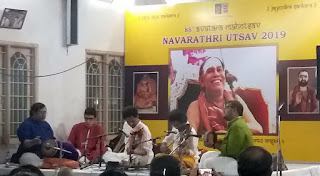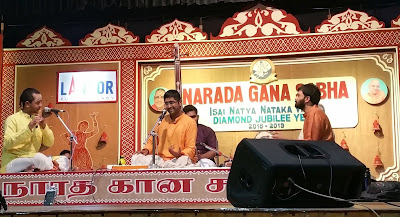On Saturday, 28th December, 2019, we had the pleasure of attending a nice concert of Vidwan Girijashankar Sundaresan accompanied by Vidwan Pappu Gyandev on the violin and Vidwan Sudhindra on the mridangam. Chennai Fine Arts hosted this concert at Shastri Hall, Mylapore. All the artists were ready, including a complete sound check done, by 10 minutes before 3 PM! The artists as well as the audience were having an awkward wait, before Girijashankar requested the organizers at 5 minutes to 3 PM, whether they could begin the concert. The organizer was kind enough to permit saying "Though the regular audience would be walking in, expecting the start of concert at 3, let those who are already present have the pleasure of listening to one extra song."
With vigour, Girijashankar began with the Adi tALam kalyANi varnam, vanajAkshirO. This was rendered in a brisk pace, Pappu and Sudhindra playing softly and warming up to the concert. At this point I would like to point out that the audio was set optimally for the hall - not too loud, unlike some sabhas and organizations set things up, now-a-days! I also noticed that it was all controlled from a Pad device - looks like they have got the right audio folks, unlike some old sabhas still sticking to their old associations and technology! :-( OK enough of the deviation from the topic.
Girijashankar & Pappu gave a short AlApanai of Anandabhairavi before they sang the Shri Shyama Sastri kriti pAHishri girijAsutE set to rUpaka tALam. The next song was also a good surprise, which is not heard much of late in the first part of concerts - rAgam naLinakAnti. After a different structured AlApanai in this rAgam (to me it seemed more weightage was given to avarOHanam also, without losing the beautiful colour of naLinakAnti), Girijashankar took up Thanjavur Shri Sankara Iyer kriti, natajanapAlini naLinakAnti. It has been ages since I heard this and it was refreshing presentation.
The big elaboration for the afternoon was in mAyAmALavagowLa, which was again taken up from a different part of the scale. Both Girijashankar and Pappu gave an elaborate essay, followed by vidulaku mrokkEdA, the composition of Saint Thyagaraja. Neraval and Kalpanaswarams were rendered with ease by both, and Girijashankar used his nice voice well. Sudhindra then presented a very detail laya vinyAsam.
Girijashankar closed the concert with the husEni kriti of Arunachala Kavirayar, eppaDi manam tunindadO and the beHAg tillAnA of Lalgudi Shri G Jayaraman, in a flourish. Concerts of hour and 15 minutes are difficult to plan for - and we could understand the team's intent to take an extra 5 minutes, by starting early. Hope organizers give at minimum an hour and half for concerts. It was satisfying afternoon spent with the music & the good audio settings in Shastri Hall.
 |
| Girijashankar Sundaresan, Pappu Gyandev and Sudhindra |
Girijashankar & Pappu gave a short AlApanai of Anandabhairavi before they sang the Shri Shyama Sastri kriti pAHishri girijAsutE set to rUpaka tALam. The next song was also a good surprise, which is not heard much of late in the first part of concerts - rAgam naLinakAnti. After a different structured AlApanai in this rAgam (to me it seemed more weightage was given to avarOHanam also, without losing the beautiful colour of naLinakAnti), Girijashankar took up Thanjavur Shri Sankara Iyer kriti, natajanapAlini naLinakAnti. It has been ages since I heard this and it was refreshing presentation.
The big elaboration for the afternoon was in mAyAmALavagowLa, which was again taken up from a different part of the scale. Both Girijashankar and Pappu gave an elaborate essay, followed by vidulaku mrokkEdA, the composition of Saint Thyagaraja. Neraval and Kalpanaswarams were rendered with ease by both, and Girijashankar used his nice voice well. Sudhindra then presented a very detail laya vinyAsam.
Girijashankar closed the concert with the husEni kriti of Arunachala Kavirayar, eppaDi manam tunindadO and the beHAg tillAnA of Lalgudi Shri G Jayaraman, in a flourish. Concerts of hour and 15 minutes are difficult to plan for - and we could understand the team's intent to take an extra 5 minutes, by starting early. Hope organizers give at minimum an hour and half for concerts. It was satisfying afternoon spent with the music & the good audio settings in Shastri Hall.



















